人教版-必修五-Unit-1-Great-Scientists-Reading-公开课-教案
- 格式:docx
- 大小:13.50 KB
- 文档页数:5
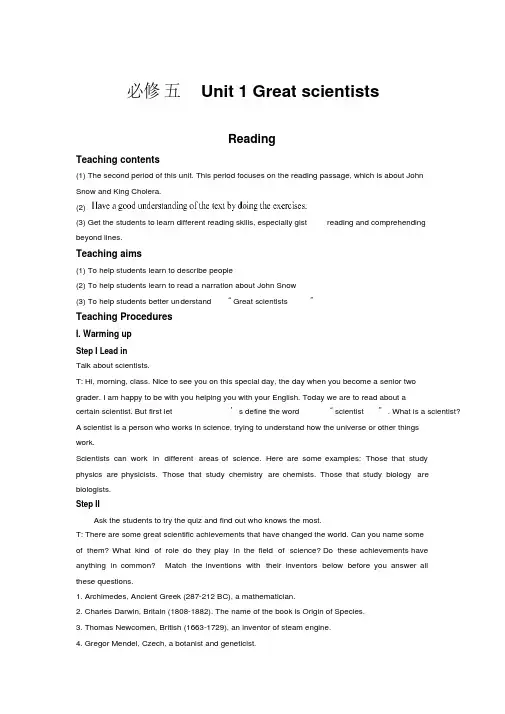
必修五Unit 1 Great scientistsReadingTeaching contents(1) The second period of this unit. This period focuses on the reading passage, which is about JohnSnow and King Cholera.(2)(3) Get the students to learn different reading skills, especially gist reading and comprehendingbeyond lines.Teaching aims(1) To help students learn to describe people(2) To help students learn to read a narration about John Snow(3) To help students better understand “Great scientists”Teaching ProceduresI. Warming upStep I Lead inTalk about scientists.T: Hi, morning, class. Nice to see you on this special day, the day when you become a senior twograder. I am happy to be with you helping you with your English. Today we are to read about acertain scientist. But first let’s define the word “scientist”. What is a scientist?A scientist is a person who works in science, trying to understand how the universe or other thingswork.Scientists can work in different areas of science. Here are some examples: Those that study physics are physicists. Those that study chemistry are chemists. Those that study biology are biologists.Step IIAsk the students to try the quiz and find out who knows the most.T: There are some great scientific achievements that have changed the world. Can you name someof them? What kind of role do they play in the field of science? Do these achievements have anything in common? Match the inventions with their inventors below before you answer allthese questions.1. Archimedes, Ancient Greek (287-212 BC), a mathematician.2. Charles Darwin, Britain (1808-1882). The name of the book is Origin of Species.3. Thomas Newcomen, British (1663-1729), an inventor of steam engine.4. Gregor Mendel, Czech, a botanist and geneticist.。
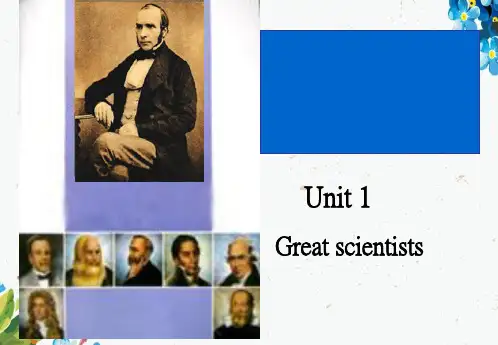
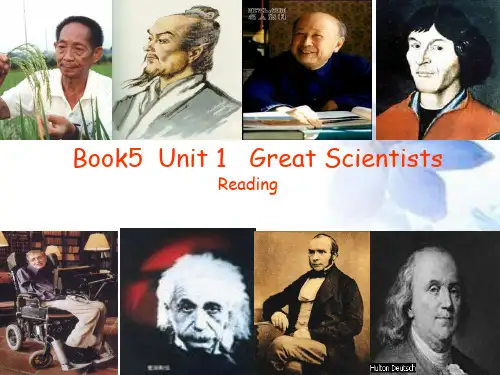
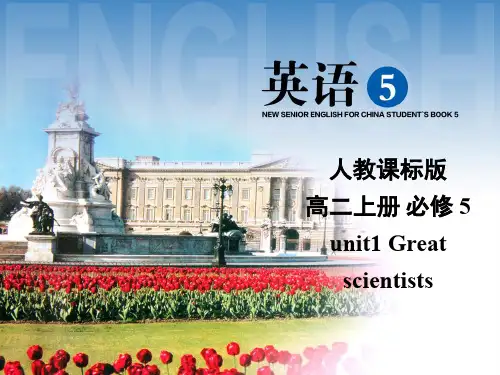
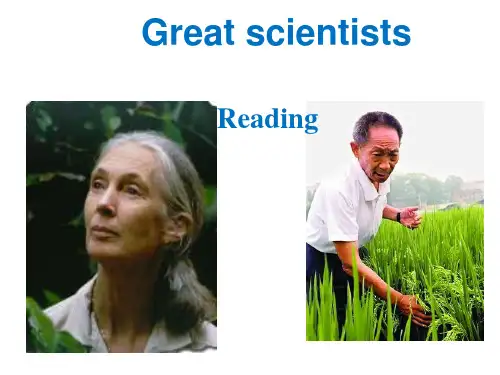
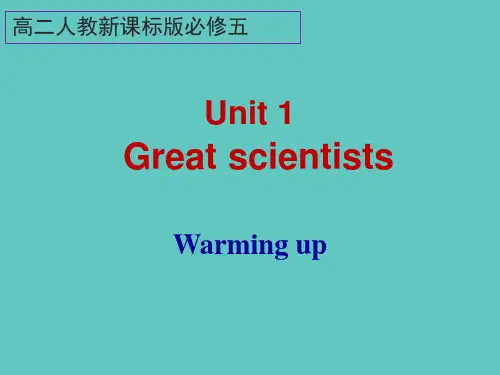
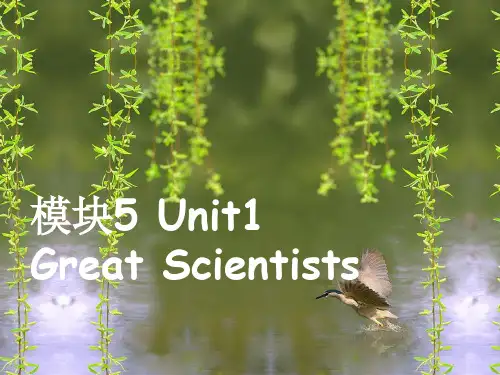
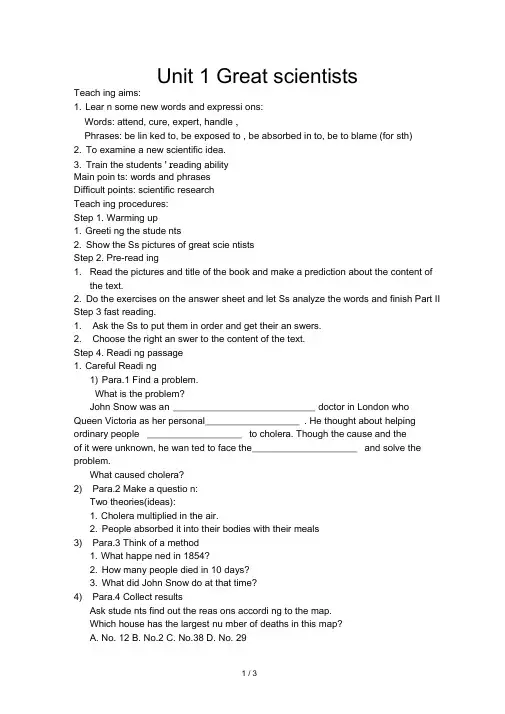
Unit 1 Great scientistsTeach ing aims:1. Lear n some new words and expressi ons:Words: attend, cure, expert, handle ,Phrases: be lin ked to, be exposed to , be absorbed in to, be to blame (for sth)2. To examine a new scientific idea.3. Train the students ' r eading abilityMain poin ts: words and phrasesDifficult points: scientific researchTeach ing procedures:Step 1. Warming up1. Greeti ng the stude nts2. Show the Ss pictures of great scie ntistsStep 2. Pre-read ing1. Read the pictures and title of the book and make a prediction about the content ofthe text.2. Do the exercises on the answer sheet and let Ss analyze the words and finish Part II Step 3 fast reading.1. Ask the Ss to put them in order and get their an swers.2. Choose the right an swer to the content of the text.Step 4. Readi ng passage1. Careful Readi ng1) Para.1 Find a problem.What is the problem?John Snow was an ___________________________ doctor in London who Queen Victoria as her personal __________________ . He thought about helping ordinary people __________________ to cholera. Though the cause and theof it were unknown, he wan ted to face the ____________________ and solve the problem.What caused cholera?2) Para.2 Make a questio n:Two theories(ideas):1. Cholera multiplied in the air.2. People absorbed it into their bodies with their meals3) Para.3 Think of a method1. What happe ned in 1854?2. How many people died in 10 days?3. What did John Snow do at that time?4) Para.4 Collect resultsAsk stude nts find out the reas ons accordi ng to the map.Which house has the largest nu mber of deaths in this map?A. No. 12B. No.2C. No.38D. No. 295) Para.5 Analyse the results1.What happened to the pump water?2. What did the people do?6) Para.6 Find supporting evidenceWhat ' s the extra evidence?7) Para.7 draw a conclusionThe polluted water caused cholera.To prevent cholera from spreading again, what did John Snow do?①Suggested that the source of all water supplies be examined.②Instructed the water companies not to expose people to the polluted water any more.Step 5 Revision and summary1. review “How did John Snow defeat ‘ King Cholera '”Let students revise the procedure of the research.1. Summarize the passage.John Snow-a doctor, ___ Queen Victory as her personal ______ .But he was willing to help ordinary people _____ cholera.Many people died ____ there was an .He wanted to face the and solve the problem.Two theories caught her attention.The first suggested that cholera multiplied in theair.The second suggested that people this disease into their bodies and the disease thebody.John Snow ________ the second was right but he needed evidence.When another outbreak hit London in 1854,he was ready to begin his . ___________ and tried to get information.He found that most of the deaths were near a water and the spread of the disease was ________________________________ water.With the evidence,he was able to ________________________________ that polluted water carried the virus.After tha,the suggested the source of all the water supplies ______________ .Finally “King Cholera ” was ___________ .Step 6 Write a report:1. The question is whether too much homework is good for us.2. Use the steps to get your conclusion.Step 7. Homework1. Make sentences with the following words and phrases: challenge; announce; instruct; attend; be exposed to; absorb..into; be to blame2. Do exercise 1, 2 and 3 on page.Blackboard Design:New wordPut forwardScientific science scientist SerereBe linked to Vocabulary. TitleEnglish meaning come up withbadbe connected withI. words and meaning1. cure (para.1) a medical treatment2. victim (para.2) a person who were injured or killed as the result of a disease, etc:3. suspect (para.3) to have an idea that sth is probably true4. enquiry (para.3) the act of asking questions or collecting information about sb/stha machine that is used to force liq uid, gas or air into or 6. 7. 8. II. Circlethe answer that best matches the meaning of each bold word or phrase..9. expert: Joh n Snow was a famous doctor in London -so expert, in deed, that heattended Queen Victoria as her personal physician. (para.1)A. a person with special knowledge, skill or training in a particular fieldB. done with, having great knowledge or skill10. attend: John Snow was a famous doctor in London -so expert, indeed, that heattended Queen Victoria as her personal physician. (para.1)A. be present atB. take care of (sb); look after11. (be )exposed to: He thought about helping ordinary people exposed to cholera.(para.1)A. to leave sb/sth/oneself uncovered or unprotectedB. to tell the true facts about a person or a situation12. cure : Neither its cause nor its cure was understood.(para.1)A . to make sb healthy againB . a medicine or medical treatment13. absorb •…in to/ People absorbed it into their bodies with their meals. (para.2)A. to interest sb very much so that they pay no attention to anything elseB. to take (sth) in; suck up14. be to blame (for sth): It seemed that the water was to blame for cholera.(para.4) A.to be responsible for sth bad B. to think or say that sb/sth is responsible for sth bad15. handle :Remove the handle from the water pump so that it could not be used. (para.5)A. part of a toolB. to deal with, manage or controlIII SummaryJohn Snow - a doctor , 1. _____________ Queen Victory as her personal2. ___________ .But he was willing to help ordinary people3. ___________ cholera. Many people died4. ___________ there was an5. ____________ .He wanted to face the6. ___________ and solve the problem. Two theories caught her attention. The first suggestedthat cholera multiplied in the air. The second suggestedthat people7. ____________ this diseaseinto their bodies and the disease8. ____________ the body. John Snow9. ____________ the second was right but he needed evidence. When another outbreak hit London in 1854 , he was ready to begin his 10. and tried to get information. He found that most of the deaths werenear a water 1 1 . __________ and the spread of the disease was 12. ___________ water. With the evidence ,he was able to 1 3. _________ that polluted water carried the virus. After that , he suggested the source of all the water supplies 14. .Finally5. pump (para.4) outof sth foresee(para.4) announce (para.6) instruct (para.7) to predict; to know about sth before it happens to make (sth) known publicly give orders ordirections to sb“King Cholera ” was 15. _______________________________________ .。
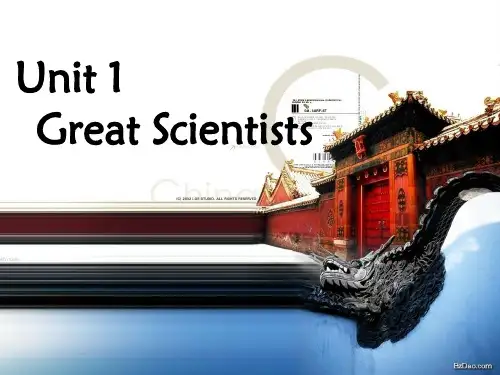
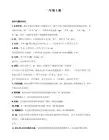
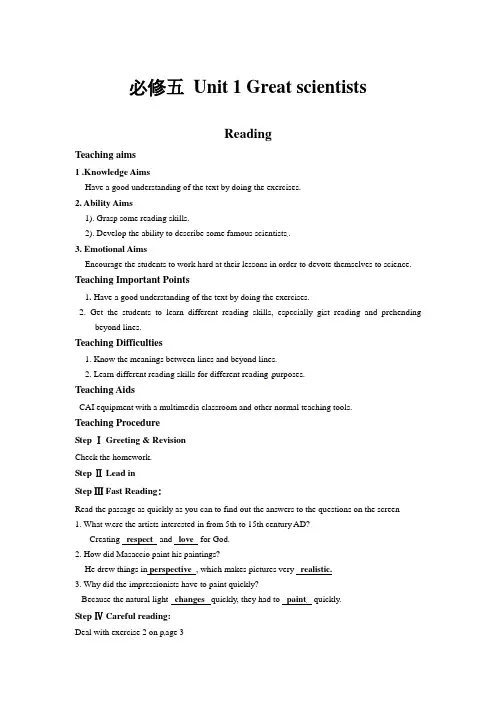
必修五 Unit 1 Great scientistsReadingTeaching aims1 .Knowledge AimsHave a good understanding of the text by doing the exercises.2. Ability Aims1). Grasp some reading skills.2). Develop the ability to describe some famous scientists.3. Emotional AimsEncourage the students to work hard at their lessons in order to devote themselves to science. Teaching Important Points1. Have a good understanding of the text by doing the exercises.2. Get the students to learn different reading skills, especially gist reading and prehendingbeyond lines.Teaching Difficulties1. Know the meanings between lines and beyond lines.2. Learn different reading skills for different reading purposes.Teaching AidsCAI equipment with a multimedia classroom and other normal teaching tools.Teaching ProcedureStep Ⅰ Greeting & RevisionCheck the homework.Step Ⅱ Lead inStep Ⅲ Fast Reading:Read the passage as quickly as you can to find out the answers to the questions on the screen1. What were the artists interested in from 5th to 15th century AD?Creating _respect_ and _love_ for God.2. How did Masaccio paint his paintings?He drew things in perspective_, which makes pictures very _realistic.3. Why did the impressionists have to paint quickly?Because the natural light _changes_ quickly, they had to _paint_ quickly.Step Ⅳ Careful reading:Deal with exercise 2 on p age 3True or False1. Western art has changed very little over the last seventeen centuries. F2. Painters in the Middle Ages painted mainly religious subjects. T3. Paintings in the Middle Ages were very realistic. F4. Renaissance painters tried to paint things in a realistic way. T5. Two important discoveries in the Renaissance period were oil paints and drawing in perspective.T6. Impressionists painted their pictures mainly indoors. F7. At first people did not like the impressionists’ paintings. T8. Modern art began with the impressionists. TStep Ⅴ DiscussionGo through the passage and analyze the characters of each period.Step Ⅵ. SummaryThe style of Western art has changed ____ _____ , while Chinese art has changed___ ____. Art is_________ by the way of ____and_______.During the Middle Ages, the main_____ of painters was to ______ _______themes. Artists were _________ ____ creating _______and _____for God.In the Renaissance, people became_______ more on _______and less on_______. Artists tried to paint _____ and _______ ____they really______.Masaccio used___________ in his paintings which made people________ they were _______ _______a hole in the wall ____ a real scene.In the late 19th century, Europe changed __________from a mostly_________ society to a mostly_________ one. The ___________were the first to paint_______. T hey had to paint ______and their paintings were not ___ _____ ___ ______of earlier painters.Today people accept ___________ ________as the ________ of_______ ____. Some modern art is _______while some is________.Step Ⅶ. Homework1. Underline the time expressions in the reading passage.2. Retell the passage with the help of the ch art about the text.3. Discuss the questions in Ex 3 on page 3.。
Unit 1 Great scientistsTeach ing aims:1. Lear n some new words and expressi ons:Words: attend, cure, expert, handle ,Phrases: be lin ked to, be exposed to , be absorbed in to, be to blame (for sth)2. To examine a new scientific idea.3. Train the students ' r eading abilityMain poin ts: words and phrasesDifficult points: scientific researchTeach ing procedures:Step 1. Warming up1. Greeti ng the stude nts2. Show the Ss pictures of great scie ntistsStep 2. Pre-read ing1. Read the pictures and title of the book and make a prediction about the content ofthe text.2. Do the exercises on the answer sheet and let Ss analyze the words and finish Part II Step 3 fast reading.1. Ask the Ss to put them in order and get their an swers.2. Choose the right an swer to the content of the text.Step 4. Readi ng passage1. Careful Readi ng1) Para.1 Find a problem.What is the problem?John Snow was an ___________________________ doctor in London who Queen Victoria as her personal __________________ . He thought about helping ordinary people __________________ to cholera. Though the cause and theof it were unknown, he wan ted to face the ____________________ and solve the problem.What caused cholera?2) Para.2 Make a questio n:Two theories(ideas):1. Cholera multiplied in the air.2. People absorbed it into their bodies with their meals3) Para.3 Think of a method1. What happe ned in 1854?2. How many people died in 10 days?3. What did John Snow do at that time?4) Para.4 Collect resultsAsk stude nts find out the reas ons accordi ng to the map.Which house has the largest nu mber of deaths in this map?A. No. 12B. No.2C. No.38D. No. 295) Para.5 Analyse the results1.What happened to the pump water?2. What did the people do?6) Para.6 Find supporting evidenceWhat ' s the extra evidence?7) Para.7 draw a conclusionThe polluted water caused cholera.To prevent cholera from spreading again, what did John Snow do?①Suggested that the source of all water supplies be examined.②Instructed the water companies not to expose people to the polluted water any more.Step 5 Revision and summary1. review “How did John Snow defeat ‘ King Cholera '”Let students revise the procedure of the research.1. Summarize the passage.John Snow-a doctor, ___ Queen Victory as her personal ______ .But he was willing to help ordinary people _____ cholera.Many people died ____ there was an .He wanted to face the and solve the problem.Two theories caught her attention.The first suggested that cholera multiplied in theair.The second suggested that people this disease into their bodies and the disease thebody.John Snow ________ the second was right but he needed evidence.When another outbreak hit London in 1854,he was ready to begin his . ___________ and tried to get information.He found that most of the deaths were near a water and the spread of the disease was ________________________________ water.With the evidence,he was able to ________________________________ that polluted water carried the virus.After tha,the suggested the source of all the water supplies ______________ .Finally “King Cholera ” was ___________ .Step 6 Write a report:1. The question is whether too much homework is good for us.2. Use the steps to get your conclusion.Step 7. Homework1. Make sentences with the following words and phrases: challenge; announce; instruct; attend; be exposed to; absorb..into; be to blame2. Do exercise 1, 2 and 3 on page.Blackboard Design:New wordPut forwardScientific science scientist SerereBe linked to Vocabulary. TitleEnglish meaning come up withbadbe connected withI. words and meaning1. cure (para.1) a medical treatment2. victim (para.2) a person who were injured or killed as the result of a disease, etc:3. suspect (para.3) to have an idea that sth is probably true4. enquiry (para.3) the act of asking questions or collecting information about sb/stha machine that is used to force liq uid, gas or air into or 6. 7. 8. II. Circlethe answer that best matches the meaning of each bold word or phrase..9. expert: Joh n Snow was a famous doctor in London -so expert, in deed, that heattended Queen Victoria as her personal physician. (para.1)A. a person with special knowledge, skill or training in a particular fieldB. done with, having great knowledge or skill10. attend: John Snow was a famous doctor in London -so expert, indeed, that heattended Queen Victoria as her personal physician. (para.1)A. be present atB. take care of (sb); look after11. (be )exposed to: He thought about helping ordinary people exposed to cholera.(para.1)A. to leave sb/sth/oneself uncovered or unprotectedB. to tell the true facts about a person or a situation12. cure : Neither its cause nor its cure was understood.(para.1)A . to make sb healthy againB . a medicine or medical treatment13. absorb •…in to/ People absorbed it into their bodies with their meals. (para.2)A. to interest sb very much so that they pay no attention to anything elseB. to take (sth) in; suck up14. be to blame (for sth): It seemed that the water was to blame for cholera.(para.4) A.to be responsible for sth bad B. to think or say that sb/sth is responsible for sth bad15. handle :Remove the handle from the water pump so that it could not be used. (para.5)A. part of a toolB. to deal with, manage or controlIII SummaryJohn Snow - a doctor , 1. _____________ Queen Victory as her personal2. ___________ .But he was willing to help ordinary people3. ___________ cholera. Many people died4. ___________ there was an5. ____________ .He wanted to face the6. ___________ and solve the problem. Two theories caught her attention. The first suggestedthat cholera multiplied in the air. The second suggestedthat people7. ____________ this diseaseinto their bodies and the disease8. ____________ the body. John Snow9. ____________ the second was right but he needed evidence. When another outbreak hit London in 1854 , he was ready to begin his 10. and tried to get information. He found that most of the deaths werenear a water 1 1 . __________ and the spread of the disease was 12. ___________ water. With the evidence ,he was able to 1 3. _________ that polluted water carried the virus. After that , he suggested the source of all the water supplies 14. .Finally5. pump (para.4) outof sth foresee(para.4) announce (para.6) instruct (para.7) to predict; to know about sth before it happens to make (sth) known publicly give orders ordirections to sb“King Cholera ” was 15. _______________________________________ .。